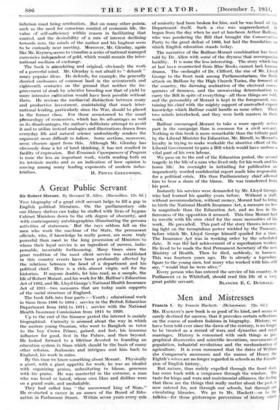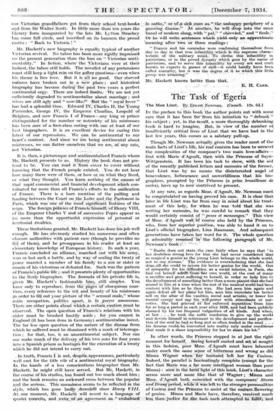Men and Mistresses
Francis I. - By Francis -Hackett. ' (1eirremanri:. 12s. 6(1.) Mn. HACKETT'S new -book is- so good. Of its kind,.and seems so surely destined for success, that it provokes certain reflections on the course of modern fashions in biography. History, we have been told ever since the dawn of the century, is no longer to be treated as a record -of 'wars and dynasties and royal marriages. History is concerned with such things as geo- graphical discoveries and scientific inventions, movements of population, industrial revolutions and the mechanization of agriculture. It is even rumoured that the dates of William the Conqueror's successors and the names of- Henry the Eighth's wives are nnlongerregarded in schools as the founda- tion of English history.
But nature, thus rudely expelled through the front door, has come back with a vengeance through the window. The taste for-kings and wars and matrimonial -alliances, the feeling that these arc the things that really matter about the past, Is now catered for, not through our schools, but through our circulating libraries. We go to Mr. Hackett—or to the talkies—for those picturesque perversions of history whIeh oust Victorian grandfathers got from their school text-books and from Sir Walter Scott. In little more than ten years the literary form inaugurated by the late Mr. Lytton Strachey 114.s come full circle, and inscribed on its banners the proud motto : " Back to Victoria ! "
Mr. Hackett's new biography is equally typical of another Victorian revival. No taboo has been more rigidly impre'Ssecl on the present generation than the ban on Victorian senti- mentality." In fiction, where the Victorians were at their lushest, the taboo still holds. The novelist of any pretensions must still keep.a-tight:rein on the, gofter emotions-=even. when his theme is free love. But it no good. Our starved natures have broken out in a new place ; and historical biography has become during," the past two years a perfect sentimental orgy. There' are indeed limas., We are not yet sufficiently degraded •-to sentimentalize about marriage ; and Wives are still ugly and fi cow-liker -Brit-the " royal lover " has had a splendid:time. Edward IV, Charles II,-the Young Pretender, George IV, the Emperor Claudius, Leopold of Belgium, and now Francis I of France—any king or prince distinguished for the number or -notoriety of his mistresses has been sure of a-first-elass;outing7.with one at least of our best biographers. It is an excellent device for curing this latest of our repressions. We can be sentimental to our heart's content. And -since we are being sentimental about mistresses, we can flatter ourselves 'that we are, at any rate, not Victorian.
It is, then, a picturesque and sentimentalized Francis whom Mr. Hackett presents to us. Itigtory the hook, does_not pre- tend to be. You. can read it'liorit cover to cover without knowing that thei-French people eldsted. You do not hear how many there were of them,_or how or, on what they lived, or what they thought. You learn nothing of the :causes of that rapid commercial and financial development_which con- tributed far more than all Francis's efforts to the unification of France. There is a bare mention of the pulling and hauling between the Court on the ,Loire ,andthe Parlement in Paris, which was brie of the Most signifieint featiires of the reign. The foreign tioliciek-of Francis' hiniiielt-blilenry VIII, of the Emperor CluirleS V and of successive Popes appear as no more than the opportiMist expression of personal or territorial rivalrieS.
These limitations granted, Mr. Hackett lias done his .job well enough. He has obviously iirtudied his numerous and often obscure authorities with patient care (though he provides no list of them), and he presuppoges in his reader at least an elementary knowledge of European history. In such a year, Francis concluded an alliance, 'matched out with hie-army,
w on or lost such a battle, and by way of sealing the treaty of peace married a member of his family to :a son or sister or cousin of his victorious or defeated foe. Such was the pattern of Francis's public life ; rand it presents plenty of opportunities t O. the lively biographer. The- formula of. his .private -life is, given Mr. Hackett's fashionable bias, still simpler. You have only to reproduce, from the pages of obsequious cour- tiers, every reference to the wit and beauty of his mistresses iuorder to fill out your picture of the " sensual male," whose main occupation, politics apart, is la guerre amoureuse. There are other points ahoui which ,a certaincantionmust be . observed. The open 'question of Francis's relations with his sister must be brushed hastily aside ; for you cannot, in England (it has been done in Germany) sentimentalize incest. The far less open question of the nature of the disease from which he suffered must be dismissed with a mark of interroga- tion ; for that, too, is an unsentimental subject. Nor can one make much ,of the, delivery of his two sons for four years into a Spanish prison as hostages for the execution of a treaty which he did not intend to carry out.
In truth, Francis I is not despite appearances, particularly 'well cast for the title role of a sentimental royal biography. In the hands of a less conscientious biographer than Mr. Hackett, he might still have served. But Mr, Hackett; in ihe course Of his studies, haifound out too much about, him ; and the book remains an awkward cross between the popular and the serions. This uneasiness seems to be reflected in the style, which has gone badly :downhill since Henry Viii. At. one moment, Mr. Hackett will resort to a language of quaint inace,ftei and Arltip-:pPan:agreement.. a--" 0:441.4114.4 in oaths,"- or of a sick man as." the unhappy periphery of a . sick, man
disease." At another, he will d'rop into the most banal of modern slang, with " pal," " chivvied," and " fizzle."
Or he will write sentences which yield only an approximate- `meaning after two or three readings :
" Francis and his comrades were confirming themselves from day ,to clay in that iron infantility -which Is the supreme charac: teriatic of the military mind. To clothe this infantility in patriotism, or in the proud dynasty which goes by the name of patriotism, and to serve this infantility' by every art and craft known to experts -in games of skill—it could hardly have been called maturity, but it was the degree of. it to which this little group was attaining." -
Mr. Hackett knows better than that. E. H. Cana..



















































 Previous page
Previous page